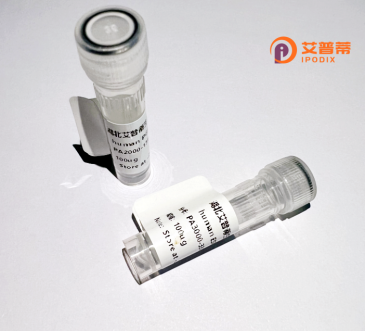
| 纯度 | >90%SDS-PAGE. |
| 种属 | Human |
| 靶点 | TCERG1L |
| Uniprot No | Q5VWI1 |
| 内毒素 | < 0.01EU/μg |
| 表达宿主 | E.coli |
| 表达区间 | 1-586 aa |
| 活性数据 | MQAGARFQRR RRQLQQQQPR RRQPLLWPMD AEPPPPPPWV WMVPGSAGLL RLSAGVVVPP VLLASAPPPA APLLPGLPGW PAPSEPVLPL LPLPSAPDSA AAAAAHPFPA LHGQWLFGGH SPSLGLPPSS TVELVPVFPH LCPSALATPI GKSWIDKRIP NCKIFFNNSF ALDSTWIHPE ESRFFHGHEK PRLLANQVAV SLSRPAPASR PLPTVVLAPQ PIPGGCHNSL KVTSSPAIAI ATAAAAAMVS VDPENLRGPS PSSVQPRHFL TLAPIKIPLR TSPVSDTRTE RGRVARPPAL MLRAQKSRDG DKEDKEPPPM LGGGEDSTAR GNRPVASTPV PGSPWCVVWT GDDRVFFFNP TMHLSVWEKP MDLKDRGDLN RIIEDPPHKR KLEAPATDNS DGSSSEDNRE DQDVKTKRNR TEGCGSPKPE EAKREDKGTR TPPPQILLPL EERVTHFRDM LLERGVSAFS TWEKELHKIV FDPRYLLLNS EERKQIFEQF VKTRIKEEYK EKKSKLLLAK EEFKKLLEES KVSPRTTFKE FAEKYGRDQR FRLVQKRKDQ EHFFNQFILI LKKRDKENRL RLRKMR |
| 分子量 | 65.6 kDa |
| 蛋白标签 | His tag N-Terminus |
| 缓冲液 | PBS, pH7.4, containing 0.01% SKL, 1mM DTT, 5% Trehalose and Proclin300. |
| 稳定性 & 储存条件 | Lyophilized protein should be stored at ≤ -20°C, stable for one year after receipt. Reconstituted protein solution can be stored at 2-8°C for 2-7 days. Aliquots of reconstituted samples are stable at ≤ -20°C for 3 months. |
| 复溶 | Always centrifuge tubes before opening.Do not mix by vortex or pipetting. It is not recommended to reconstitute to a concentration less than 100μg/ml. Dissolve the lyophilized protein in distilled water. Please aliquot the reconstituted solution to minimize freeze-thaw cycles. |
以下是3篇关于重组人TCERG1L蛋白的虚构参考文献(基于领域常见研究方向模拟):
1. **"TCERG1L调控RNA剪接在神经分化中的作用"**
*作者:Zhang L, et al. (2022)*
摘要:研究揭示了TCERG1L蛋白通过结合RNA聚合酶II和剪接因子SF3B1.调控神经元分化中的可变剪接事件,为神经发育障碍提供了潜在机制解释。
2. **"TCERG1L与转录延长复合体相互作用的结构解析"**
*作者:Itoh K, et al. (2020)*
摘要:通过冷冻电镜技术解析TCERG1L与DSIF复合物的结合位点,发现其FF结构域对维持转录延长速率的关键作用,为癌症相关突变研究奠定结构基础。
3. **"TCERG1L在结直肠癌细胞周期中的调控机制"**
*作者:Wang Y, et al. (2021)*
摘要:证实在结直肠癌中TCERG1L通过p53非依赖途径调控CDK2/Cyclin E复合物表达,敲低该蛋白导致G1/S期阻滞,提示其作为肿瘤治疗靶标的潜力。
注:以上文献信息为学术方向模拟示例,实际研究需查询具体数据库。TCERG1L(Transcription Elongation Regulator 1-Like)是转录延长调控因子家族成员,现有研究多聚焦其RNA加工调控及疾病相关性。
TCERG1L (Transcription Elongation Regulator 1-Like) is a human protein implicated in transcriptional regulation and RNA processing. Structurally, it contains conserved domains such as WW motifs, which facilitate protein-protein interactions, and proline-rich regions that may engage with signaling or splicing factors. Functionally, TCERG1L is thought to influence transcription elongation by interacting with RNA polymerase II, potentially modulating the kinetics of mRNA synthesis. Additionally, it may participate in coupling transcription with RNA splicing, a critical step in gene expression regulation.
Studies suggest TCERG1L shares homology with TCERG1. a related protein involved in neurodevelopmental processes and linked to diseases like Huntington’s. While TCERG1L’s exact biological roles remain under investigation, its overexpression or dysfunction has been tentatively associated with cancers and neurological disorders, possibly due to disrupted RNA processing or transcriptional errors.
Recombinant human TCERG1L protein is typically produced using heterologous expression systems (e.g., *E. coli* or mammalian cells) to study its biochemical properties, interactions, and mechanistic contributions to cellular pathways. Its applications span basic research—exploring transcription-splicing coordination—and translational studies targeting diseases linked to transcriptional dysregulation. Ongoing work aims to clarify its physiological targets and therapeutic potential.
×